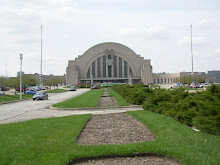A now three-part series looking at the National Political Party Conventions in Cincinnati.
National Liberal Republican Party held their one and only Convention in Cincinnati. You may be thinking, “The Liberal Republicans were not a major political party.” Or you may be thinking, “Who the heck were the Liberal Republicans anyway?” Well in my research for this series I stumbled upon them. Unfortunately I didn’t remember them from American History . . . if I ever even really learned about them in the first place. But their ticket of Horace Greeley for President and B. Gratz Brown for Vice-President, that was selected in May 1872, at Exposition Hall, was the same ticket that the Democrats nominated in Baltimore two months later!

Let us go back to 1872, shall we.
Ohioan Ulysses S. Grant was the incumbent President. But some reform members within the Republican Party considered Grant and his administration corrupt. So in May these reform Republicans met in Cincinnati to nominate their own candidate. The mainstream Republicans referred to them as the "The Cincinnati Sore Heads." In June the Republican Party regulars easily re-nominated President Grant for a second term.
Rutherford B. Hayes actually attended the Liberal Republican Party Convention in Cincinnati. Here is an excerpted entry from his online diary at the Rutherford B. Hayes Presidential Center:
May 6, 1872.
"With Lucy and Miss Emma Foote and others, attended the Liberal Republican Convention on the second and third, the two important days. We witnessed the intense disappointment of our friends Matthews and Hoadly when Adams was beaten by Greeley. At the moment, the feeling was common that Grant would win. I am not confident of results. If the Democrats adopt Greeley as their candidate he may win, and win by a large majority. The people are sick of politics, ready for change, and may break in any new direction. Yet, I rather incline to the opinion that the Democrats will find a dissent in their own ranks, when they take up Greeley, which they can't control--a dissent strong enough to let Grant keep the chair.
A queer result, it is. Free-traders nominate their bitterest and most formidable foe; a party whose strength is mainly in the German element, which is clamorous against temperance fanaticism, nominates the author of that fanaticism! Democrats are required to support a man who said that he would go for Grant in preference to any Democrat. 'Anything to beat a Democrat,' has been and was up to the day of his nomination his lifelong motto."
Hayes was a Republican Party regular but I guess he was there to just check things out. If he had been a Liberal Republican, he would not have been put up by the Republicans for US Congress in fall 1872 in Ohio’s 2nd District. (He did not want to run and he lost to Democrat Henry Banning in a wave of local anti-Republican sentiment.) And he would have never been the compromise candidate for US President in 1876. Apparently he did take some flack later for including Carl Schurz, a Liberal Republican, on his cabinet.
The Democrats then met in July, and looking for any candidate to try and beat Grant, nominated Greeley and Brown just as Hayes wondered in his diary. The Democratic National Convention lasted only six hours and is the shortest Democratic National Convention on record.
Grant of course won big. As Hayes says in his diary entry of November 7, 1872 “But what a victory for General Grant! It is simply ‘prodigious’!” Greeley actually dies shortly after the popular election in November but yet before the Electoral College meets. So he ended up not getting any electoral votes at all.
References:
Wikipedia: U.S. Presidential Election - 1872
Profiles of U.S. Presidents by Keith Ian Polakoff
Image from Wikipedia
.jpg)

No comments:
Post a Comment